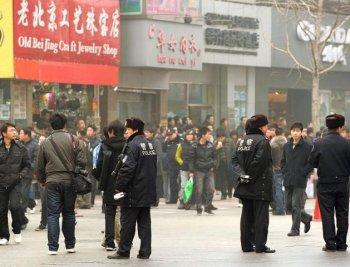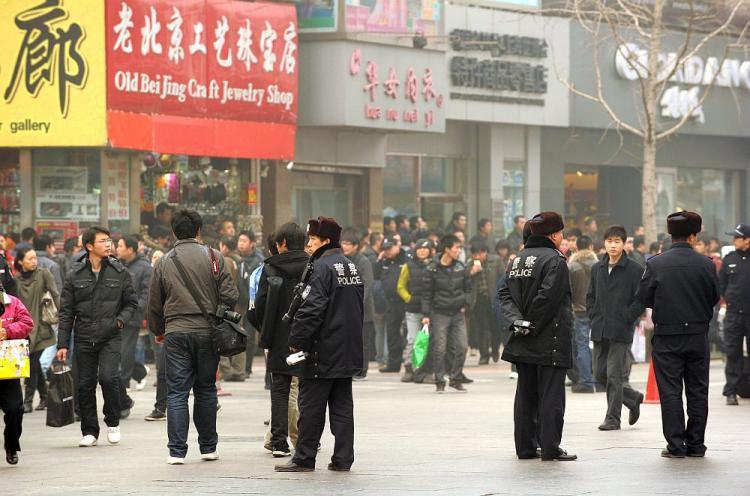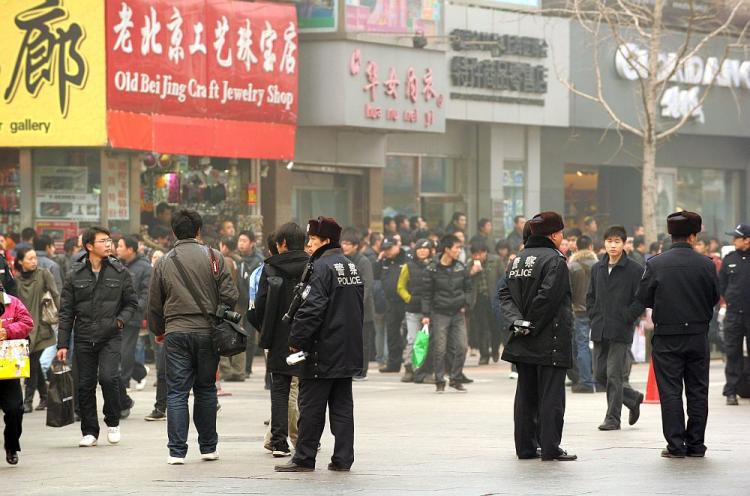As unrest spread the last few weeks throughout the Middle East, speculation mounted as to when the Chinese people would stage their own “Jasmine Revolution.” Anonymous calls for such a protest to take place this past Sunday appeared on China’s Internet, but some now say those calls to action were a hoax staged by the Chinese Communist Party (CCP).
On Feb. 17, an anonymous netizen posted on twitter claiming that the first date for China’s “Jasmine Revolution” had been determined. On Feb. 19, another post titled “China’s Jasmine Revolution Gathering Locations in Major Cities” appeared on the news website Boxun, which is based outside China.
The post on Boxun listed the meeting places at 2 p.m. on Feb. 20 in 13 Chinese cities including Beijing. Other cities were to gather at the city’s center square.
On Feb. 20, a large number of police, plain clothes police, and members of the state-run media showed up at Wangfujing in Beijing, one of the protest locations posted online. The police arrested many people. A large number of dissidents had also been arrested earlier.
Shi Zangshan, a Washington D.C.-based China expert, says that the CCP arranged for high-profile media coverage of the arrests in order to demonstrate its suppression of a Jasmine Revolution-style campaign. The motive, according to Shi, was to create the illusion that the CCP has everything tightly under control.
Some of the media coverage, in addition to reporting on the suppression of the protests, claimed that Falun Gong practitioners, among others, initiated the event.
On Feb. 21 Taiwan’s Apple Daily published an article entitled “Jasmine Revolution Breaks Out in 13 Chinese Cities,” which claimed that the initiators included Falun Gong. World Journal, a Chinese newspaper published in the U.S., also reported that the movement was propelled by Wang Dan, the Tiananmen Square pro-democracy leader who is now in the United States, and by what it called the “religious organization Falun Gong.”
Yang Sen, the president of the U.S. Midwest Falun Dafa Association, commented on media reports that Falun Gong practitioners were responsible. “We are people who cultivate ourselves according to the principles of truthfulness, compassion, and tolerance,” Yang said. “We do not get involved in politics ... We have no attitude in this matter. The development of this event is strange. My personal opinion is that it is likely to be initiated by the Chinese Communist Party, with the purpose of further persecuting anyone it considers a threat.”
“I also question the news sources and professionalism of some media,” Yang added.
An article published by Aboluowang, a Chinese-language website based outside of China, analyzed the event and concluded that this Jasmine Revolution was very likely a trap. The CCP wanted to use a fake call for protests to arrest the most bold and courageous Chinese, the article said. This would help prevent protests from being organized in the future and scare people away from participating, according to the article.
Shi said that the anti-authoritarian trend in Middle East has scared the CCP a great deal, which fears seeing the domino effect of the disintegration of dictatorships coming to China. He believes that pro-CCP media reported on the aborted protests on Sunday in such a way as to put fear in people’s minds.
[email protected]
Read the original Chinese article.
This article was last updated on Feb 22 at 3pm EST





